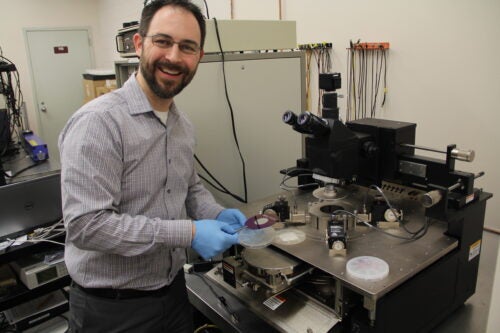
By Jenn Ambrose
The human brain can process vast amounts of real-world information using less energy than a typical light bulb. It also can learn new abstract concepts and readily adapt to changing environments and situations. Finding a way to mimic these abilities of the brain using electronics could radically alter our approach to computing.
That is just what Kurtis Cantley’s research team intends to do. Cantley, an assistant professor in the Department of Electrical and Computer Engineering at Boise State, has received a five-year, $548,882 grant from the National Science Foundation (NSF) as part of the Faculty Early Career Development (CAREER) Program. It is the agency’s highest honor for faculty members at the start of their research and teaching careers.
“In order to develop biologically realistic learning technologies, we must create ways to emulate an array of very complex biological mechanisms,” said Cantley.
Cantley is particularly interested in the synaptic connections between neurons, which are believed to be ultimately responsible for memory, reasoning, perception and other higher-order cognitive functions. Building on emerging semiconductor device and circuit technologies, Cantley plans to use his CAREER award funding to investigate the properties of circuits with biologically realistic learning. The award will lead to development of electronic spiking neural networks that capture the dynamic synaptic learning modalities found in the brain.
This is Cantley’s third such honor for early-career faculty, having already received young investigator grants awarded by the Defense Threat Reduction Agency for $322,866 in 2017 and the Air Force Office of Scientific Research for $359,429 in 2014.
In addition, Cantley’s CAREER grant supports integrated education and outreach activities designed to enhance understanding and awareness of biological and electronic neural networks for middle and high school students.
“I am excited to see the innovative work being done in our college,” said JoAnn Lighty, dean of the College of Engineering. “I am especially proud to see our hard-working young faculty being recognized for their outstanding research efforts by such an important award.”
The CAREER Award Program is the NSF’s most prestigious award in support of early-career faculty who have the potential to serve as role models in research and education and to lead academic advances. This notable award recognizes those who work to support of the mission of their departments, their universities and their communities as a whole. This is the sixth such award made to electrical and computer engineering faculty since the department first began offering classes in 1996.